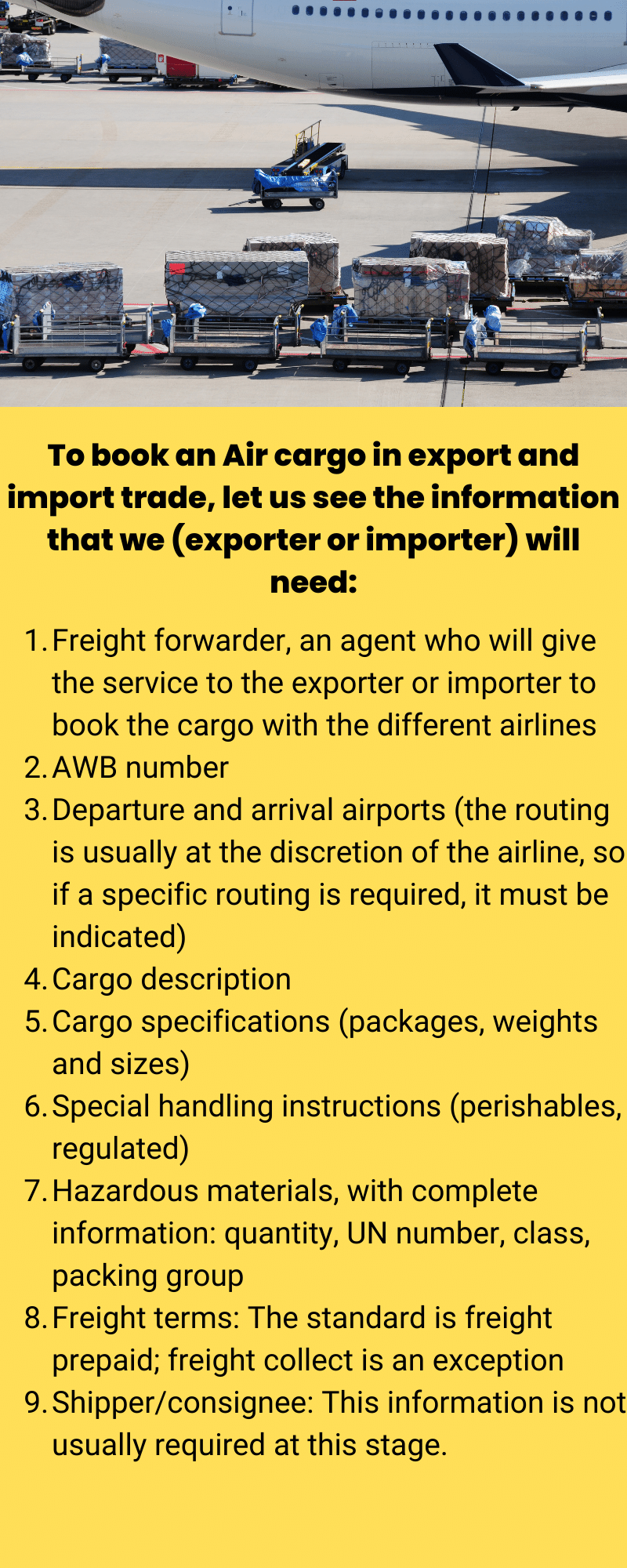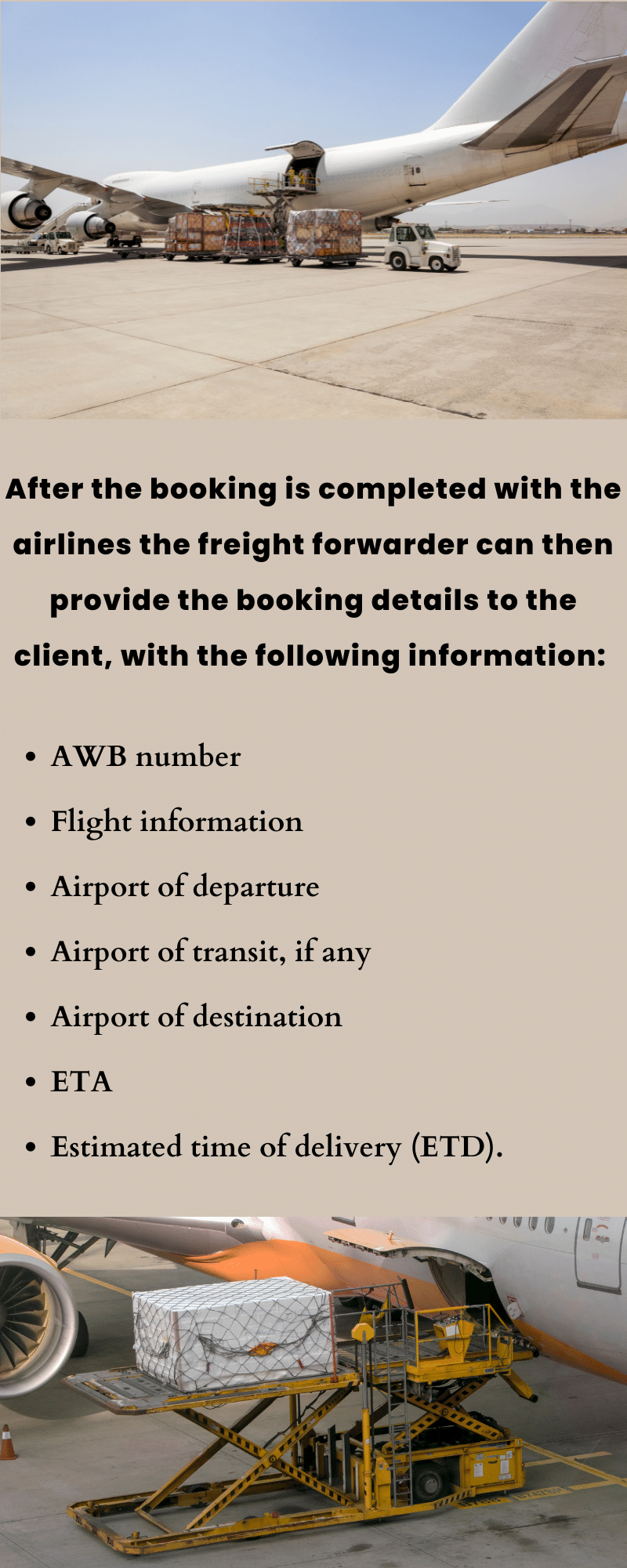Information Needed to Book a Air Cargo
For booking air cargo with an Airlines in export and import trade, let us see the information that we (exporter or importer) will need:
- Freight forwarder, an agent who will give the service to the exporter or importer to book the cargo with the different airlines
- AWB number
- Departure and arrival airports (the routing is usually at the discretion of the airline, so if a specific routing is required, it must be indicated)
- Cargo description
- Cargo specifications (packages, weights and sizes)
- Special handling instructions (perishables, regulated)
- Hazardous materials, with complete information: quantity, UN number, class, packing group
- Freight terms: The standard is freight prepaid; freight collect is an exception
- Shipper/consignee: This information is not usually required at this stage.
It is to be note that the booking is placed for a specific flight on a specific date, and the delivery address/warehouse location must be determined separately ahead of time, as this varies from airline to airline.
The latest cut-off time for delivery of cargo and information/documentation is usually four hours before the flight, but this varies.
Table of Contents
- Information Needed to Book a Air Cargo
- Information that are provided by the Freight Forwarder to the client after the Booking of the goods is completed with the Airlines
- The Air Waybill Number
- Air Charters
- What are the key points to focus while choosing an airline for cargo transportation?
Information that are provided by the Freight Forwarder to the client after the Booking of the goods is completed with the Airlines
After the booking is completed with the airlines the freight forwarder can then provide the booking details to the client, with the following information:
- AWB number
- Flight information
- Airport of departure
- Airport of transit, if any
- Airport of destination
- ETA
- Estimated time of delivery (ETD)
Let us go into detail explanation on the importance of some information at the time of booking:
The Air Waybill Number
Each shipment receives a serial number for identification: the air waybill (AWB) number.
An AWB number has two parts:
- A three-digit airline identifier (for example, 014 is the identifier for Air Canada and all of its AWB numbers start with 014)
- An eight-digit serial number. This number is the most important factor in identifying a shipment throughout the transportation process, right up to the delivery at the airport of final destination
- The Commodity
For cargo reservations, it is essential to know the nature of the goods to be loaded on any aircraft.
For instance, certain dangerous goods (toxins/poisons) must not be loaded together with foodstuffs; live animals need heated and well-ventilated conditions; fragile goods, which generally require more space than normal cargo, must be loaded and positioned very carefully in the aircraft.
To check the completeness of a shipment during loading, transfer or delivery, the total number of packages must be known.
- The Weight of the Shipment
Since an aircraft has a limited payload or capacity, correct information on the weight of each shipment is necessary.
This is particularly the case when handling heavy goods, since equipment for loading and unloading must be validated in advance.
- The Dimensions and Volume of the Shipment
Information concerning the dimensions of a shipment is essential for planning, to ensure the cargo will fit in/on the ULDs. Not only the weight capacity, but also the volume capacity available in an aircraft is limited.
Package dimensions must be identified on the air waybill, either in centimetres or in inches.
- The Airport of Departure, Transfer Point and Airport of Destination
The names of the airports of departure and final destination, as well as any transfer point are necessary for the following reasons:
- To determine the routing of the shipment
- To arrange for suitable storage prior to departure, at the transfer point or after arrival
- To allow communication in the case of irregularities during transportation
- To allow for special arrangements by the shipper at any transit point or at the airport of destination.
- The Requested Routing
Information about the requested flight(s) is important for the shipper/consignee and the agent.
If a connecting flight is involved, it is essential to know its flight number to ensure there is enough time for the transfer from incoming to outgoing aircraft at the connecting airport.
Only with these details at hand will it be possible to arrange the quickest transportation of a shipment in cooperation with the airline.
Air Charters
Normal air freight shipments are carried on scheduled flights at predetermined rates as explained earlier.
However, under certain or special circumstances, the shipper may wish to move cargo that:
- Cannot be accommodated on normal flights
- Is too urgent to wait for a scheduled flight
- Is far heavier than a normal load.
In such instances, you may be required to charter an aircraft. Charter companies offer all types of aircraft, from small planes to a Hercules, a Boeing 747, or an Antonov 124 capable of lifting 150,000 kg of freight.
When chartering, the party signing the charter agreement is responsible for all charges. The cost is determined by the charter operator and is based on a roundtrip journey. For example, if you wanted to charter a DK10 from New York to Tokyo to carry 45,000 kg of freight, the charter operator would quote you New York /Tokyo/ New York, even if you did not have any use for the Tokyo/ New York leg of the flight.
What are the key points to focus while choosing an airline for cargo transportation?
- Airlines with a global network
- Available capacity
An airline that has good capacity will tend to be cheaper, because of the space it needs to fill, and less likely to bump the cargo.
Capacity depends on the frequency of service (daily flights are the best), the types of aircraft they use, and the number and types of pallets or ULDs they accommodate.
- Seasonality
Is also an important factor, as the year-end trade, U.S. Thanksgiving, Chinese New Year and similar events bring a surge in volume, resulting in tight space and higher rates.
- Good regional connections
Airlines serving niche geographic markets will provide better service to smaller destinations.
- Safety records
- Tracking and Tracing facility of the cargo
- Weather conditions and/or the likelihood of weather disruptions
- Pricing
In most cases pricing will be one of the first elements you consider.
Pricing depends on many factors, including supply and demand, space availability, specifics of a particular shipment, season, timing, etc., as well as the relationship a forwarder has with a particular airline and the volume the forwarder ships with that airline.
Some airlines give spot-deals on certain lanes for a limited time, and some may give relatively better rates based on complete ULDs rather than a per-kg rate.
The key here is to “shop” smartly, consider the price but also all of the other factors mentioned above, in order to arrive at the best overall value.


